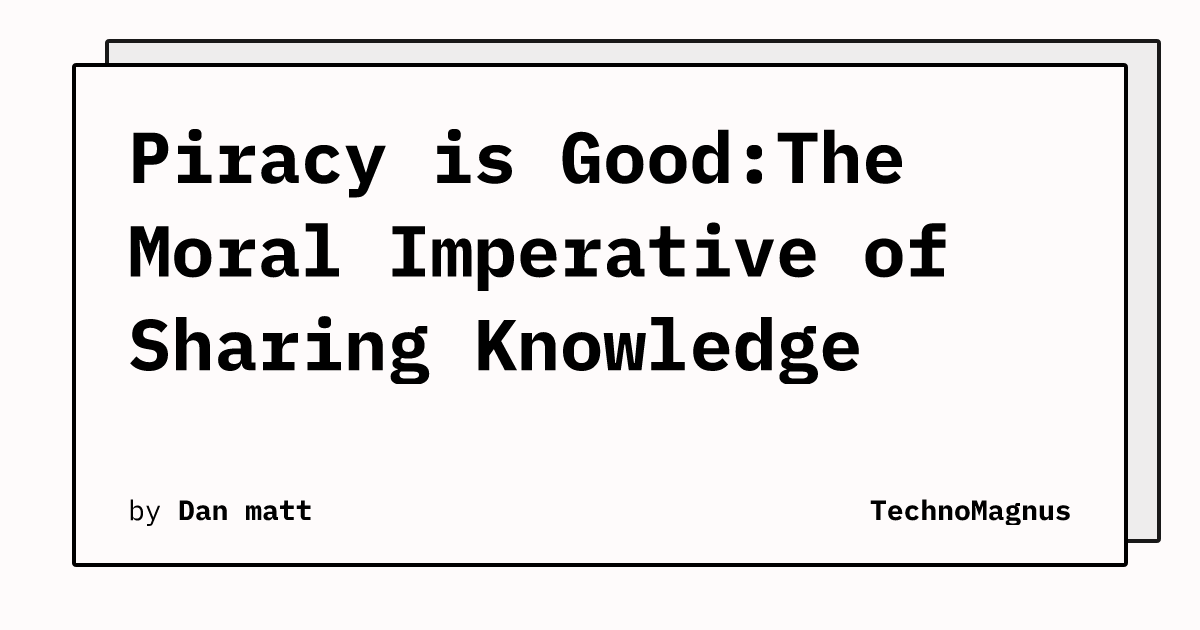Piracy, in today’s context of unauthorized sharing of digital content, is wrongly condemned as immoral theft. However, it is not piracy itself that is immoral. Rather, it is the greed-driven laws and practices that censor knowledge and creative works to maximize profits. At its core, piracy is about sharing information and creative works with others, which should be seen as a moral good. 🤑
It’s not stealing, the corporations are just working for the exposure.
Knowledge does want to be free, but its a stretch to say Guardians 3 is a unit of “knowledge”. Creative works kinda don’t want to be free; Guardians is only desirable because of the cast and crew’s work, and you acting out the script is not the same at all. We shouldn’t devalue creative labour, even as pirates.
Piracy cuts into the profits of studio investors, and that’s good, without impacting how much actors and crew are paid. Win/win.
True, but the length of copyright protection nowadays is far beyond what is reasonable. Any copyright past the original 34 year limit is corporate theft from the public domain imo
Man that is an absurdly difficult issue to address. Yes, you are right that copyright is just awful for everyone. But really the problem is not copyright per se, it’s that (for example) Amazon preferred to burn hundreds of millions of dollars to get the rights to an IP when they were going to make up their own story anyway. If Tolkein’s work were PD (which it should be, btw) it would have saved Amazon some money but they still utterly lack any good ideas and felt that being linked to a famous work would turn a terrible set of scripts into a sure fire winner.
I understand the points and while I don’t like the rampant corporate greed, you wouldn’t have billion dollar movie projects (or series) if piracy was entirely legal and encouraged.
I think it’s mostly that the current copyright laws and patents are unfair.
Let’s take a big IP such as star wars, wouldn’t it be more logical if it were in the public domain? It’s almost de facto in the public domain. I can refer to it and almost anybody gets what I’m talking about. It’s already a staple of our hegemonic culture. Nobody should own it.
But you know, to get those movies, I wouldn’t mind if there was let’s say a 1-2 year copyright on the movie. You don’t want to wait a year? Pay. Simple as that.
Same for patents. Ad long as we are a capitalistic society, it’s desired that research makes profit, so put a patent for a few years and voila!
In the end you are going to stimulate more research. First by sharing knowledge and second by encouraging new research which can be patented. No sitting on a patent for years doing nothing.
I understand the points and while I don’t like the rampant corporate greed, you wouldn’t have billion dollar movie projects (or series) if piracy was entirely legal and encouraged.
We may not get billion dollar movie projects, but I bet it would change the landscape and we would gain smaller projects with better results. You have to think, these billion dollar corporations stifle artist, which is why music today is synthesized crap and movie studios are churning out cookie-cutter plots and woked-up remakes no one asked to be created.
Oh no synth is because computers are readily available and anybody can make music. Before you had to be more dedicated.
There still exists good musicians and productions, but they are not backed by big studios…
Which lead to your point. Big studios don’t like risks. They don’t want to be creative. Fine! No more big budget movies.
But a movie production is still expansive. Even low and good indie movies sometimes have a million dollar budget. That’s way more than the budget for a hobby for most people!
So how do we finance it? Governments, non profits? Sure… But still that is possible today and it is done, but it’s far from being a source of constant good movies.
And finally sure the diaspora of piracy is wide and large. Some are activists and do really important work such as scihub and libgen, but most people just pirate the latest marvel movie
Yes. I’m all for sharing knowledge but to be honest most of piracy nowadays is porn and entertainment. So I wonder if the article argument cover them too.
Dunno about porn, but there’s cultural value in “entertainment”.
There is cultural value in entertainment. And as modern people we have a need for meaningful forms of entertainment that help us process and make sense of the world. But it’s still not “knowledge”. Knowledge needs to be free because there is no set way to use it; but Curb Your Enthusiasm is just a thing to watch for entertainment. If you are a legit Curb scholar then you have a copyright exemption, even.
You can object to the ludicrous avarice of studios and networks while still saying that creative work is real work, and that even if we personally can’t afford or don’t want to pay for it, that society as a whole should reward creativity.
Why do we want to go down the deep ocean’s?





